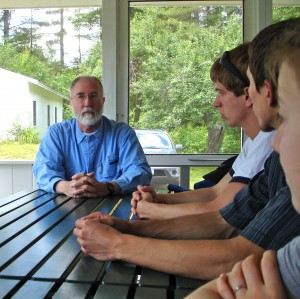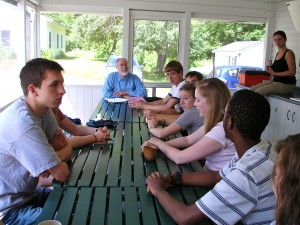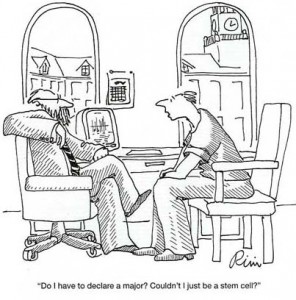Dr. James Collins is the Director of the Directorate for Biological Sciences at the National Science Foundation. Additionally he is a Virginia M. Ullman Professor of Natural History and the Environment in the School of Life Science at Arizona State University.
Essentially, he is very important.

He is visiting Hubbard Brook this week as the keynote speaker for the 2009 Cooperators Meeting, and spoke to the REU students Monday afternoon.
His talk included how he got interested in science, his work in biology, how the NSF works, and the future of careers in biology among other topics.

Personally, I thought it was great that Dr. Collin's took so much interest in what we as students are working on, and how we perceive the research world. The session was much more of a conversation than a lecture.
For audio from his talk, please click here: http://tiny.cc/JamesCollinsTalk
Did you always want to be a scientist? (And, why biology?)
While he was always interested in the natural world. Dr. Collin's initially wanted to be a pet store owner when he was younger (we're talking elementary school). Later on, his more realistic ideas included becoming either a pediatrician or something else in the field of biology. After working as a part of a research team in the Bahamas, he decided to pursue a career in research science.
What are some of your current projects?
His current work includes the biology and ecology of infectious diseases, diseases and wildlife, and how diseases can cause species extinction. Most of his work is conducted using amphibians (mainly salamanders), and studying the decline of organisms such as bats (via white nose syndrome) and chestnuts in the Eastern United States.
Additionally, he is busy working as the Director of the Biology programs at the National Science Foundation, and in his *spare* time he has just completed a book titled "Extinction in Our Times; Global Amphibian Decline". It can be found at the address below:
http://tiny.cc/ExtinctionInOurTime
Do you have any advice for aspiring young undergraduate scientists like us?
- It's okay to not know what you want to study!
- Be ready for the opportunities that will come along
- Use your contacts and networks
- Go where your heart wants to take you
- Don't worry about the money!
- Enjoy it!
